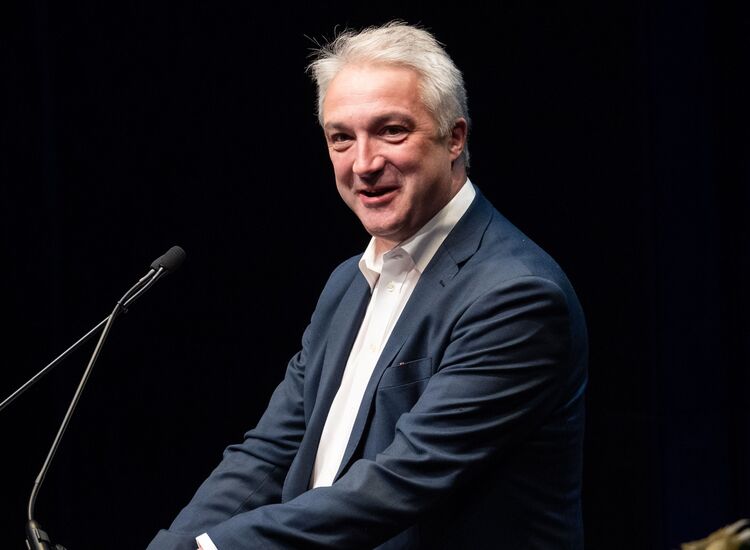Denis Donoghue was described by the Irish Times as “one of the world’s foremost scholars of modern literature” when it reported his death last week at the age of 92. He was still at 81 traveling from Dublin each year to teach for a semester at NYU when interviewed by the Irish Echo for this piece, which appeared in the Jan. 13, 2010, edition.
By Peter McDermott
Denis Donoghue’s brilliant career as a literary critic and academic began informally back in the 1950s after a chance encounter.
He’d started his working life as a junior administrative officer in the Department of Finance following his graduation from University College Dublin with a BA in Latin and English in 1949 and sitting for the Civil Service examination — the latter a “misstep,” he said in a recent interview.
Donoghue, whose eldest son is an Irish ambassador and who was witness to an early stage of the dazzling career of T.K. Whitaker, the official associated with the 1960s boom under Taoiseach Sean Lemass, believes he had no special aptitude for the duties assigned him.
“I couldn’t say that the three and half years were miserable, but they certainly weren’t joyful,” recalled the 81-year-old Donoghue, who is the Henry James Chair of American Letters and English at New York University.
His career change happened due to a “piece of astounding good luck”: he met Jeremiah J. Hogan, his old English professor, walking along the street. “I hear you’re in the Civil Service. Do you like that?” Hogan asked him.
Donoghue replied that he didn’t. Hogan said: “Oh I’m very sorry to hear that because I intended when you finished your degree to offer you a job in the department.”
When the young civil servant inquired if the job might still be available, his old teacher said: “Oh yes, by all means.” Donoghue, who had in the meantime acquired an MA, asked when he should start.
“I believe you are obliged to offer the minister for finance one month’s notice,” Hogan said.
Though he’d gotten married on his 23rd birthday, Donoghue gave up his secure job without learning the terms and conditions of the UCD position.
“I didn’t inquire. I was so thrilled,” he said.
When he reported on the first day of the new academic year in October, Hogan said to him: “I wonder, Donoghue, would you take the class on ‘King Lear’?”
“I said: ‘When do they meet.’ He said: ‘I’m afraid they’re waiting for you now in the Physics Theatre.’”
In that first semester, he taught 25 classes on “King Lear” and 25 on “Hamlet.”
More than 55 years on, Donoghue still enjoys lecturing. After he retired from UCD, he maintained his long-standing arrangement with NYU. He lives for the last four months of the year at an apartment on Washington Square West, and is based for the rest of the year in Dublin.
In his contribution to a book of essays in honor of Donoghue, novelist Colm Toibin recalled from his first week at UCD in October 1972 a lecturer at the podium who was “exceedingly tall, distant and formidable.” Toibin, a 17-year-old from Enniscorthy, Co. Wexford, thought the professor’s “aura bore the hallmark of one of the great Irish houses.” He was surprised to learn that Donoghue had in fact been born into relatively modest circumstances at his mother’s family home in Tullow, Co. Carlow, just a few miles from Enniscorthy.
Donoghue’s father, a Kerry native, had joined the Royal Irish Constabulary in the early 20th century after his grandfather, a boatman, had died on the lake at Killarney. Unusually for a Catholic RIC man from the South, Sergeant Donoghue opted later to join the new Royal Ulster Constabulary after partition in 1922. He raised his family in Warrenpoint, Co. Down.
Professor Donoghue, whose memoir “Warrenpoint” appeared in 1990, said his father’s choices weren’t in any sense based on ideology. He described himself as a lifelong nationalist. “I detest the border,” he said, adding, however, that he doesn’t see it disappearing in his life-time.
The education he received from the Christian Brothers in Newry in the late 1930s and ‘40s, he said, was “alright.” His own children — of which there are eight, including the writer Emma Donoghue — were better served, he believes, at schools like the Holy Ghost Fathers’ Blackrock College in Dublin.
He can’t say the same about the undergraduates he teaches these days.
“I continue to like the NYU students immensely, as people, as young people particularly, but I cannot admire the education that they’ve received in preparation for university,” Donoghue said. “I’m appalled and dismayed, as I’m sure many university teachers are, by the degree of illiteracy, the degree to which they have not read anything.”
The new testing fad doesn’t help matters. “Children can be taught to take the test,” he said.
This is not simply the familiar argument about the decline of standards over the years. The roots of the problem are deeper, in his view.
“I blame Emerson, the most damaging philosopher in American culture because he has encouraged students, encouraged everybody, to believe that the only crucial thing is oneself — and it’s a question of discovering what your true self is and discovering to express that,” he said, “and in the process you’re not meant to be greatly troubled by the discovery of other selves and of course if you eliminate that, there’s no point in reading literature at all.”
Gerald Manley Hopkins asked as a boy: “What must it be to be someone else.” Said Donoghue: “It’s a profound and far-reaching question, but not one that occurs very naturally in this country.”
He outlined his argument in his second most recent book (he has written or edited 35 so far) “The American Classics: A Personal Essay,” which was published in 2005.
Citing secondary literature, however, is also a problem these days. Teaching a class on Ezra Pound recently, Donoghue recommended a landmark work of criticism, “The Pound Era” by Hugh Kenner. Not one student took a note of it, so he asked them why not. “We have a lot to do” was their answer.
Donoghue stressed again that he enjoys the company of his students immensely. “And the fact that I’m centuries older than them doesn’t bother me very much,” he said.
Postscript: Denis Donoghue, who was born on Dec. 1, 1928, and died on April 6, 2021, is survived by his wife Melissa, eight children, including Emma Donoghue, grandchildren, great-grandchildren and other family members. His first wife, Frances, predeceased him.







